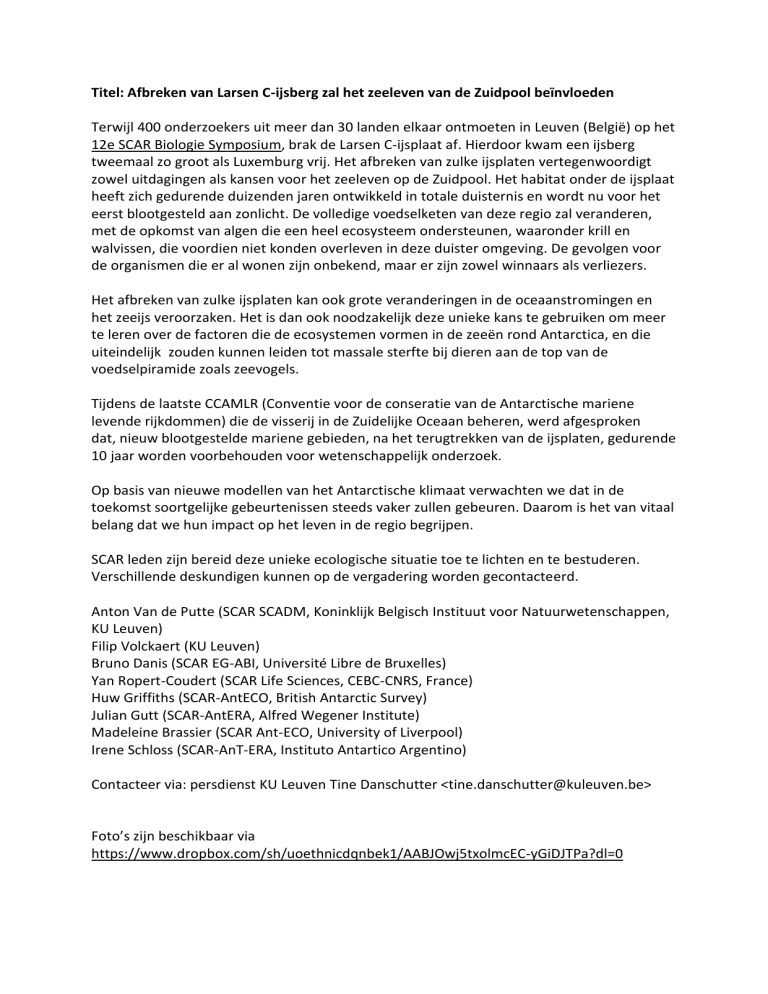
Titel: Afbreken van Larsen C-ijsberg zal het zeeleven van de Zuidpool beïnvloeden
Terwijl 400 onderzoekers uit meer dan 30 landen elkaar ontmoeten in Leuven (België) op het
12e SCAR Biologie Symposium, brak de Larsen C-ijsplaat af. Hierdoor kwam een ijsberg
tweemaal zo groot als Luxemburg vrij. Het afbreken van zulke ijsplaten vertegenwoordigt
zowel uitdagingen als kansen voor het zeeleven op de Zuidpool. Het habitat onder de ijsplaat
heeft zich gedurende duizenden jaren ontwikkeld in totale duisternis en wordt nu voor het
eerst blootgesteld aan zonlicht. De volledige voedselketen van deze regio zal veranderen,
met de opkomst van algen die een heel ecosysteem ondersteunen, waaronder krill en
walvissen, die voordien niet konden overleven in deze duister omgeving. De gevolgen voor
de organismen die er al wonen zijn onbekend, maar er zijn zowel winnaars als verliezers.
Het afbreken van zulke ijsplaten kan ook grote veranderingen in de oceaanstromingen en
het zeeijs veroorzaken. Het is dan ook noodzakelijk deze unieke kans te gebruiken om meer
te leren over de factoren die de ecosystemen vormen in de zeeën rond Antarctica, en die
uiteindelijk zouden kunnen leiden tot massale sterfte bij dieren aan de top van de
voedselpiramide zoals zeevogels.
Tijdens de laatste CCAMLR (Conventie voor de conseratie van de Antarctische mariene
levende rijkdommen) die de visserij in de Zuidelijke Oceaan beheren, werd afgesproken
dat, nieuw blootgestelde mariene gebieden, na het terugtrekken van de ijsplaten, gedurende
10 jaar worden voorbehouden voor wetenschappelijk onderzoek.
Op basis van nieuwe modellen van het Antarctische klimaat verwachten we dat in de
toekomst soortgelijke gebeurtenissen steeds vaker zullen gebeuren. Daarom is het van vitaal
belang dat we hun impact op het leven in de regio begrijpen.
SCAR leden zijn bereid deze unieke ecologische situatie toe te lichten en te bestuderen.
Verschillende deskundigen kunnen op de vergadering worden gecontacteerd.
Anton Van de Putte (SCAR SCADM, Koninklijk Belgisch Instituut voor Natuurwetenschappen,
KU Leuven)
Filip Volckaert (KU Leuven)
Bruno Danis (SCAR EG-ABI, Université Libre de Bruxelles)
Yan Ropert-Coudert (SCAR Life Sciences, CEBC-CNRS, France)
Huw Griffiths (SCAR-AntECO, British Antarctic Survey)
Julian Gutt (SCAR-AntERA, Alfred Wegener Institute)
Madeleine Brassier (SCAR Ant-ECO, University of Liverpool)
Irene Schloss (SCAR-AnT-ERA, Instituto Antartico Argentino)
Contacteer via: persdienst KU Leuven Tine Danschutter <tine.danschutter@kuleuven.be>
Foto’s zijn beschikbaar via
https://www.dropbox.com/sh/uoethnicdqnbek1/AABJOwj5txolmcEC-yGiDJTPa?dl=0
Engelse vertaling – English version
Press release – Larsen C
Title: Giant Larsen C iceberg break off will impact Antarctic marine life
While 400 researchers from more than 30 countries are meeting in Leuven, Belgium, for
the 12th SCAR Biology Symposium, the Larsen C ice shelf just calved, releasing an iceberg
twice the size of Luxembourg. Such calving events represent both challenges and
opportunities for Antarctic marine life. The habitat under the iceshelf, has evolved in total
darkness and will now be exposed to sunlight for the first time in thousands of years. The
entire food chain of this region will change, with algae supporting a whole ecosystem,
including krill and whales, that could not have survived in the dark. The consequences for
the organisms already living there are unknown but there are bound to be both winners and
losers.
Calvings can also provoke major changes in ocean circulation and sea ice conditions. We
should seize this unique chance to learn about the factors shaping the ecosystems in the
seas around Antarctica which could eventually lead to massive mortality in top predators
such as seabirds.
During the last CCAMLR (Convention for the Conservation of Antarctic Marine Living
Resources) which manages fisheries in the Southern Ocean, meeting, it was agreed that
newly exposed marine areas, following ice-shelf retreat, will fall under Time-limited special
protection for up to 10 years, reservering these areas for scientific research.
Based on new models of Antarctic climate we expect to see similar events more frequently
in the future. For this reason it is vital that we understand their impact on life in the region.
SCAR members are prepared to study this unique ecological situation.
Several experts can be contacted at the meeting
Anton Van de Putte (SCAR, Royal Belgian Institute of Natural Sciences, KU Leuven)
+32 494943806
Bruno Danis (SCAR EG-ABI, Université Libre de Bruxelles)
Yan Ropert-Coudert (SCAR Life Sciences, CEBC-CNRS, France)
Huw Griffiths (SCAR-AntECO, British Antarctic Survey)
Julian Gutt (SCAR-AntERA, Alfred Wegener Institute)
Madeleine Brassier (SCAR Ant-ECO, University of Liverpool)
Irene Schloss (SCAR-AnT-ERA, Instituto Antartico Argentino)
Pictures are available at
https://www.dropbox.com/sh/uoethnicdqnbek1/AABJOwj5txolmcEC-yGiDJTPa?dl=0


